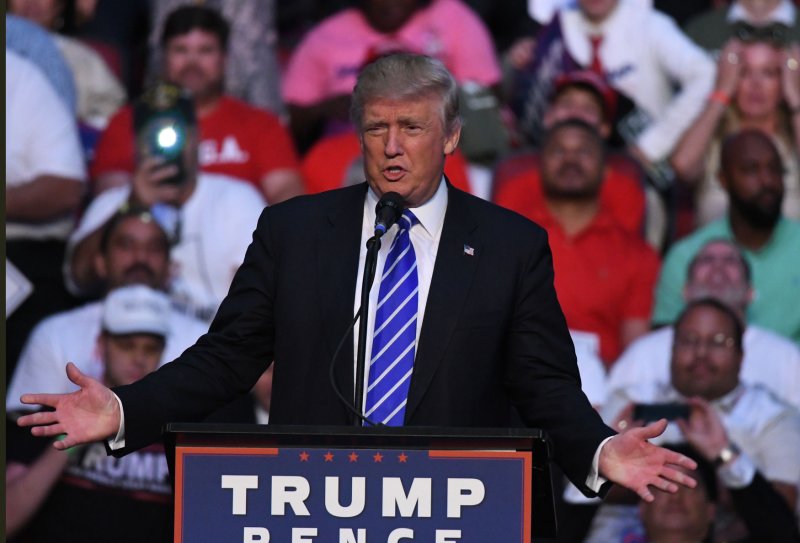Republican presidential nominee Donald Trump gives a thumbs up while speaking to supporters at a rally in Sunrise, Fla., on August 10. Photo by Gary I Rothstein/UPI |
License Photo
If Donald Trump were the dictator of a banana republic trying to hold onto power against the will of his people, this is the moment when his tanks would start rolling on his cities. Or, given his particular demolition fetish, when the nukes would start falling on them.
That's because he's heading, with reckless abandon, toward an Electoral College wipeout. His chances of winning the old-fashioned way are so far gone that his campaign and its surrogates have laid out a three-option plan for defeating Hillary Clinton: Imprison her without trial, execute her for treason (again without trial), or delegitimize our hard-earned democratic election system.
It's easy to think that the race is close because Clinton is leading Trump by "only" 6.2 percentage points in a RealClearPolitics average of recent surveys that include Libertarian Gary Johnson and Green Party nominee Jill Stein.
But the average popular-vote margin of victory in the last 10 presidential elections is 6.6 percentage points. In the same period, the winners of presidential elections have averaged 374 electoral votes — 104 more than necessary to be sworn in as president and about 70 percent of those available. With the exception of the unusually close 2000 election, the Electoral College system has skewed in a way that exaggerates popular-vote margins.
For example, when George H.W. Bush destroyed Michael Dukakis, 426-111, in the Electoral College in 1988, he won by less than 8 percentage points in the popular vote. Only twice since then — Bill Clinton in 1996 and Barack Obama in 2008 — has the winner had a wider popular-vote margin than what Clinton currently has in the average of national polls.
[Has Trump Put Texas in Play?]
More important than Trump's national polling deficit is the fact that he's trailing across traditional and nontraditional battleground states.
There are now 272 electoral votes in states that RCP rates as leaning toward Clinton, likely to go to her or solidly in her column. Another 112 come from states rated as toss-ups (plus Maine's 2nd Congressional District, from which an elector is chosen independent of the statewide result). On Wednesday morning, Clinton had a lead in six of those eight states, including a statistically insignificant three-tenths-of-a-point edge in Deep South Georgia.
Furthermore, in talking to Democratic and Republican strategists in recent days, it has become clear that the polls could be significantly underestimating the Clinton margins that we'll see on Election Day. Here's why: Clinton has poured money into both television advertising and field organizing even in states where she has an outside chance of winning while Trump has been inactive.
[
Shakeup at Top of Trump Campaign]
Republican and Democratic experts in field organizing say that a tiptop organization can make a small but significant difference — maybe as many as four or five percentage points — in a particular state. That is, where Clinton's building an operation and Trump isn't, polls are likely underrepresentative of her strength.
In a chat last week on the social media platform Sidewire, former Iowa Republican Party Chairman Matt Strawn and GOP strategist Doug Heye lamented the absence of a Trump field operation on the ground in the battleground Hawkeye State.
"The boots have largely been outsourced to the RNC staff that's been on [the] ground. They are hustling to staff up," Strawn said. "And as everyone learned watching Hillary [and] Bernie battle during caucuses, if it comes down to mechanics versus message at the end ... well, we know how that turned out."
[Trump the Degenerate Gambler]
But Trump's failure to put together even a bush league campaign organization has Republican insiders rightly worried about the long-term implications of the impending November debacle. He's refused to do the presidential year work that parties rely on to build their donor, volunteer and voter lists for future elections at the local, state and national levels.
So, the perils of Trump are not limited to losing the presidential election and dragging congressional Republicans down with him. Democratic and Republican strategists say he could do truly lasting damage to the size and strength of the party and its ability to find and mobilize like-minded voters.
[
The GOP's New Trump Test]
"Presidential races are where you can invest in data infrastructure, organizing talent, technology, etc. He is not doing that. She is," Jeremy Bird, the national field director for President Barack Obama's 2012 re-election campaign said on Sidewire. "His lack of investment is a problem for Republicans now, both at the national and local levels. And it hurts them in the long run. Her investment is helpful to the [Democratic] Party now and in the future."
The scores of GOP elites who have implored the Republican National Committee to abandon Trump and focus on down-ballot races over the next 10 weeks are absolutely right. But they should also start thinking about how they're going to build the party after Donald the Developer fails to develop a real political organization.
Roll Call columnist Jonathan Allen is co-author of the New York Times-bestselling Clinton biography "HRC" and has covered Congress, the White House and elections over the past 15 years.
Get breaking news alerts and more from Roll Call on your iPhone or your Android.















